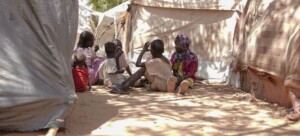‘Alarming’ COVID-19 surge among Sudan’s youth
The current surge in COVID-19 infections across Sudan is ‘alarming’, youths are especially vulnerable, and this is contributing to the spread of the virus and new, stricter measures are being mooted. The World Health Organisation (WHO) points out that health systems have been severely tested, with health workers stretched to the limit, and facilities are in danger of being overrun.
 File photo
File photo
The current surge in COVID-19 infections across Sudan is ‘alarming’, youths are especially vulnerable, and this is contributing to the spread of the virus and new, stricter measures are being mooted. The country’s ‘army in white’ of health professionals are making ‘appreciable efforts’, however as elsewhere in Africa, the World Health Organisation (WHO) points out that health systems have been severely tested, with doctors, nurses, and other health workers stretched to the limit, and facilities and systems are in danger of being overrun.
At a press conference in Khartoum yesterday, member of the Sovereignty Council and Chairman of the Committee for Health Emergencies, Siddig Tawir, described the health situation in regard to COVID-19 in Sudan as “alarming for everyone”. He added that if the current trend continues, it will require “strict measures and closures”.
Tawir said that “there has been a significant number of deaths, and COVID-19 patients are filling-up available hospital beds”. He mentioned that 200 new cases were reported on Saturday and 250 more on Sunday, [these figures have not been officially confirmed by the Ministry of Health], noting that “many of these new cases were recorded among young demographics, including schoolchildren, and that this leads to rapid transmission of the disease”.
Siddig Tawir attributes the rise in the infection rate to a lax attitude to the second wave of the pandemic and “many people thinking that the pandemic is over”. He said that many people have abandoned earlier precautionary measures of social distancing and the wearing of masks, as well as mixing on special occasions. He called for awareness and cessation of social mixing during this period.
‘The COVID-19 pandemic will not be contained as much by laws and procedures as it is by relying on public awareness’ – Siddig Tawir
As reported by Radio Dabanga last week, disinfection, and social distancing are now mandatory in Sudan’s state institutions, schools, public transport, and all gathering places subject to overcrowding, as well as in workplaces.
“The COVID-19 pandemic will not be contained as much by laws and procedures as it is by relying on public awareness.” He also encouraged people to take the vaccine and explained that 250,000 more doses of the Chinese Sinovac vaccine were received last Friday.
As previously reported by Radio Dabanga The first batch of 828,000 doses of the AstraZeneca COVID-19 vaccine arrived at Khartoum airport on 3 March. Sudan was the first country in the Middle East and North Africa (MENA) region to receive vaccines via the COVAX Facility, a coalition co-led by the World Health Organization (WHO). The roll-out of the vaccination programme began a few days later, giving priority to medical staff, police, the elderly, and those over 45 years of age with chronic conditions.
Transitional Partners Council
At a meeting in Khartoum on Monday, the Transitional Partners Council (TPC) discussed the latest developments concerning COVID-19. Speaking on behalf of the TPC, Maryam El Sadiq noted numerous absences from the meeting due to the pandemic.
She explained that all state agencies are working to fight the epidemic, and praised what she termed Sudan’s “army in white” of doctors and healthcare workers “whose members are making appreciable efforts to address the COVID-19 pandemic and are currently involved in a number of national and international initiatives”. She also appealed to the public to adhere to health precautions.
WHO concerns
According to a report this month by the World Health Organisation’s regional office for Africa, the year-long battle against the virus is now receiving a crucial boost with the arrival of vaccines through the COVAX Facility, while deaths reported have dropped by more than 50 per cent over the past 28 days compared with the previous 28 days. The case fatality ratio or the proportion of deaths among confirmed cases is at 3.6 per cent for the past 28 days. This is higher than the global average.
The report notes that COVID-19 has heavily jolted the health workforce in the African region. Since the beginning of the pandemic, 267 health worker infections have been recorded on average every day, translating to 11 new health worker infections per hour. To date, more than 100 000 health workers have contracted COVID-19 in the African region. It shows that health worker infections account for 3.5 per cent of the total number of cases in the region.
“Every new COVID-19 vaccine delivery to Africa is a step towards equity and ensuring we get our lives and livelihoods back,” said Dr Matshidiso Moeti, WHO Regional Director for Africa. “But doses will remain limited and it’s critical that frontline health workers and other priority groups are at the front of the queue. Health workers deserve protection because without their pivotal role, efforts against the pandemic can go only so far.
“The pandemic has nearly knocked loose the linchpin of the health systems in many countries,” said Dr Moeti. “We must further protect and equip our health workers to effectively contribute to the efforts to contain COVID-19. Everyone’s wellbeing is at stake without an adequately supported health workforce.”
Africa’s health systems have been severely tested, with doctors, nurses and other health workers stretched to the limit. Several studies have identified lack of personal protective equipment, exposure to COVID-19 patients, work overload, poor infection prevention and control measures as the main risk factors associated with infections in health facilities.











 and then
and then